DAVAO CITY (MindaNews / 20 April) – Alarmed by President Rodrigo Duterte’s lifting of the nearly nine-year moratorium on the grant of new mineral agreements, environmentalists and church leaders urged him to reconsider the order as they expressed fear it would spell more death among farmers and fisherfolk, and further destroy Mindanao’s environment.
Executive Order 130 lifted the ban as this would allegedly usher in “significant economic benefits to the country” and support the ‘build, build, build’ and ‘Balik Probinsya’ programs of Duterte whose six-year term ends on June 30, 2022.
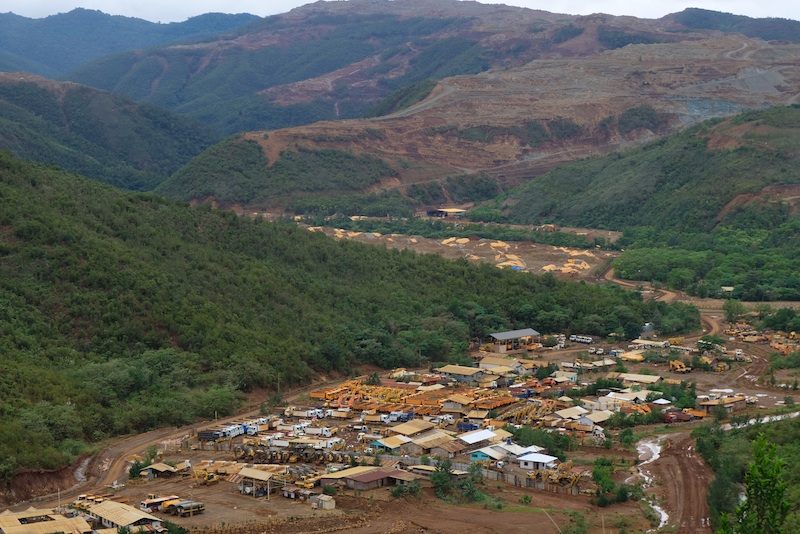 Mountains destroyed by mining operations loom large from a mining company’s base camp in Surigao del Sur. MindaNews file photo by BONG S. SARMIENTO
Mountains destroyed by mining operations loom large from a mining company’s base camp in Surigao del Sur. MindaNews file photo by BONG S. SARMIENTO
“The Catholic Church, through Caritas Philippines, the Eco-Convergence and the CBCP National Laudato Si Program strongly enjoin President Duterte to reconsider the lifting of the mining moratorium,” said Kidapawan Bishop Jose Colin Bagaforo, chair of the Catholic Bishops Conference of the Philippines’ Commission on Social Action, Justice and Peace, and National Director of Caritas Philippines.
A press release from Caritas Philippines also quoted Bagaforo as saying the lifting of the ban “is a sign of desperation to solve the ginormous economic gap caused by the COVID-19 pandemic” but is “unsustainable, destructive and extremely detrimental to the Filipino communities in the peripheries, and the Philippine ecology.”
Cagayan de Oro Archbishop Jose Cabantan warned “we will be facing another kind of threat to life and environment by the lifting of the ban.”
He cited, among others, the case of the Tampakan mining project in South Cotabato which is being opposed by the Diocese of Marbel.
“They really vehemently oppose mining in the area for the sake of the environment and the people, not just the residents there but those who will be affected by its destruction,” the Archbishop said. The EO, he added, “may create more ecological problems and human suffering.”
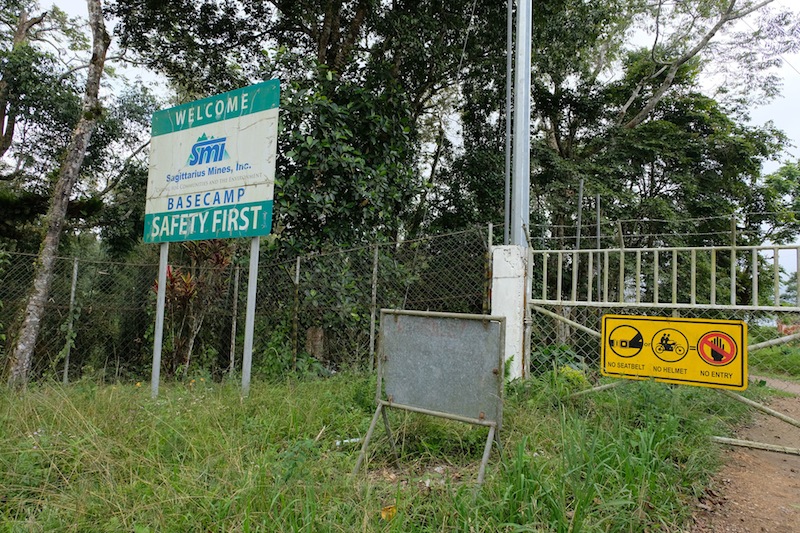 Gateway to base camp of Sagittarius Mines, Inc. in Tampakan, South Cotabato. MindaNews photo by BONG SARMIENTO
Gateway to base camp of Sagittarius Mines, Inc. in Tampakan, South Cotabato. MindaNews photo by BONG SARMIENTO
Fr. Jerome Millan, Social Action Center director of the Diocese of Marbel, said EO 130 could pave the way for Sagittarius Mines, Inc. (SMI) to proceed with its mammoth $5.9 billion Tampakan project, Southeast Asia’s largest known undeveloped copper and gold minefield.
“(This) is a very sad development for us who are working to stop the Tampakan project,” he told MindaNews.
“They’re spoiling the land, they’re destroying Mindanao”
In the early days of his Presidency in 2016, Duterte warned large-scale mining firms, mostly based in Metro Manila but operating in Mindanao, to stop what he said were “destructive” practices because “they’re spoiling the land, they’re destroying Mindanao.”
In his thanksgiving party at the Crocodile Park in Davao City on June 4, 2016, Duterte said he preferred small-scale miners, banding into a cooperative, to operate the mines “and we will just support them and give it to them and give them instructions on how not to end up spoiling the land natin dito.”
He also repeatedly said he was against open pit mining, the method SMI intends to employ to extract gold and copper in Tampakan.
SMI’s environmental clearance certificate (ECC) was canceled by Environment Secretary Gina Lopez on February 4, 2017 but the Office of the President restored it on May 6, 2019 without the public knowing. South Cotabato reporters learned about it 14 months later, during a briefing by Omar Saikol, head of Region 12’s Environmental Management Bureau, on July 9, 2020.
Saikol said they were not informed, too, on the restoration of the ECC and learned about it only when they inquired on the status of SMI’s ECC.
Last month, the local government of Tampakan urged the provincial legislature to lift the ban on open-pit mining.
More flash floods, more deaths
Emma Hotchkiss, president of the CanCarMadCarLan Baywatch Foundation, Inc, in Surigao del Sur, anticipates more flash floods and a higher death toll with EO 130.
“We have been experiencing flash floods full of silt for the past three years. Our farms have been experiencing lower yields. Two mining companies’ expired permits have been extended without stakeholders’ consent. The Department of Environment and Natural Resources (DENR), failed to protect our rights granted to us by our Constitution. Allowing the mining companies to operate illegally is a criminal act,” she told MindaNews.
Hotchkiss said miners “must have been anticipating this EO since our forest have been filling up with Exploration Permit Applications as shown in the MGB Tenement Map dated February 2021.”
EO 79, EO 130
Signed on April 14 and copies released on April 15, EO 130 lifted Section 4 of EO 79 which imposed in 2012 a moratorium on the grant of new mineral agreements.
President Benigno Aquino III signed EO 79 on July 6, 2012 “institutionalizing and implementing reforms in the Philippine mining sector,” including a moratorium on the grant of new mineral agreements “until a legislation rationalizing existing revenue sharing schemes and mechanisms shall have taken effect.”
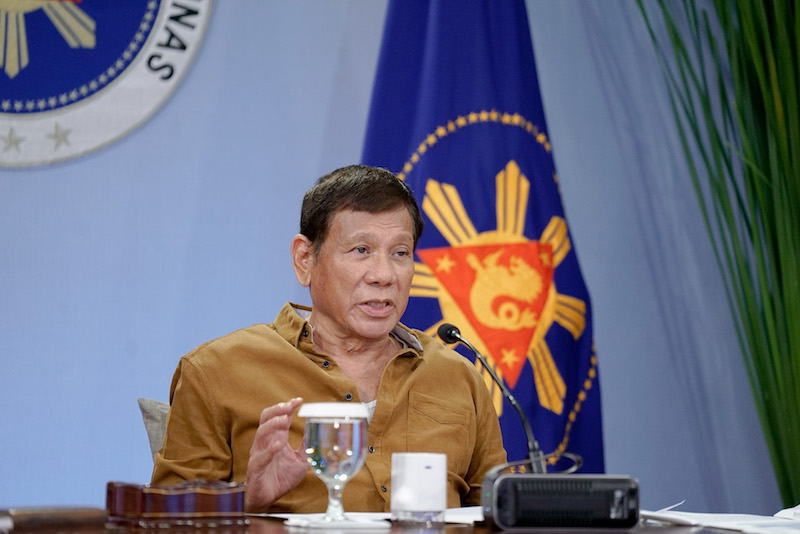 President Rodrigo Roa Duterte talks to the people after meeting with the Inter-Agency Task Force on the Emerging Infectious Diseases at the Malacañang Golf Clubhouse in Malacañang Park, Manila on April 15, 2021,. On that day, copies of EO 130 which the President signed a day earlier, were released, lifting the moratorium on mineral agreements. KING RODRIGUEZ/ PRESIDENTIAL PHOTO
President Rodrigo Roa Duterte talks to the people after meeting with the Inter-Agency Task Force on the Emerging Infectious Diseases at the Malacañang Golf Clubhouse in Malacañang Park, Manila on April 15, 2021,. On that day, copies of EO 130 which the President signed a day earlier, were released, lifting the moratorium on mineral agreements. KING RODRIGUEZ/ PRESIDENTIAL PHOTO
According to Duterte’s EO 130, Section 48 of RA 10963 or the Tax Reform for Acceleration and Inclusion (TRAIN) Act doubled the rate of excise tax on minerals, mineral products, and quarry resources from 2% to 4%.
The EO said the DENR had conducted a “thorough review of the regulatory framework of the mining industry and has in place additional rules, regulations, and policies providing for and enhancing environmental safeguards to ensure that mining operations observe environmental protection.”
The EO also said the country has tapped “less than 5% of its mineral resources endowment to date” and that in addition to “ushering significant economic benefits to the country,” the mining industry can support government projects, such as the Build, Build, Build Program, by providing raw materials for the construction and development of other industries; and the Balik Probinsya, Bagong Pag-Asa program, by increasing employment opportunities in remote rural areas where there are mining activities, thereby stimulating countryside development.”
Copies of Duterte’s EO 130 were released on April 15, a full week before Earth Day on April 22, whose theme this year is “Restore Our Earth.”
‘No economic improvement’
“We are in the countryside, and we are seeing no economic improvement in the lives of the people from mining. The government has again chosen vested interests and profit over our suffering people and ecology,” Caritas Philippines quoted Bishop Bagaforo as saying.
Caritas also quoted South Cotabato Bishop Allan Casicas of the Diocese of Marbel as saying that while the Tampakan mining can potentially generate billions of export earnings, “it will also exponentially destroy the Mindanao River Basin which will severely affect nine provinces equivalent to more than 3.5 million population.”
“Environmental Trojan horse”
Dr. Jean Lindo, Secretary-General of Panalipdan Mindanao, described EO 130 as “an environmental Trojan horse.”
“What a gift to give this coming Earth Day. It is both ecocidal and ethnocidal.
she said.
“While resource-scarce countries have demonstrated economic advancement that puts people in the equation of development, we are going the direction incompatible with sustainable and inclusive development. Now I am beginning to understand what ‘resource curse’ means.”
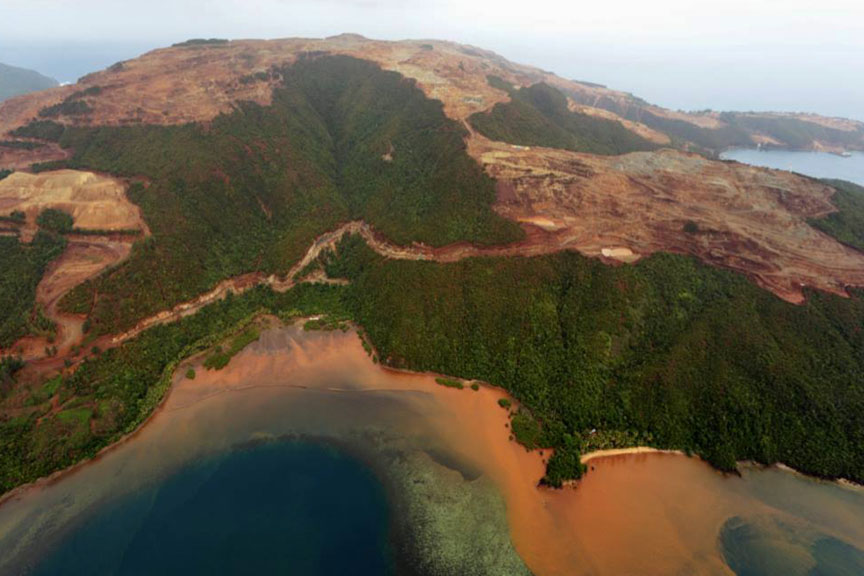 Hinatuan Island in Surigao del Norte ravaged by mining. The HInatuan Mining Corp. operating here is among the 14 mining firms in the Caraga Region ordered closed by Environment Secretary on 1 February 2017. Photo courtesy of Sec. Lopez’s Facebook page
Hinatuan Island in Surigao del Norte ravaged by mining. The HInatuan Mining Corp. operating here is among the 14 mining firms in the Caraga Region ordered closed by Environment Secretary on 1 February 2017. Photo courtesy of Sec. Lopez’s Facebook page
Lindo said claims of “responsible mining” are “just greenwashing.”
“How can it be responsible when mining makes the communities more vulnerable to flooding? How can it be responsible when the implication is for communities to drink poisoned water? How can it be responsible when this means death to environmental defenders and the indigenous and peasant sector?,” she asked.
Anti-poor
Fr. Raymond Ambray, Convener of Save Our Surigao Movement and spokesperson of CaragaWatch, said Duterte’s EO 130 is “a classic act of this administration’s sense of priority.”
“Instead of addressing the pandemic squarely, including its economic resuscitation, the Duterte regime focused on a feigned and corrupt attempt to boost the economy under the pretense of its build, build, build program” and this lifting of the moratorium.
Ambray said the mining industry is “pro-capitalist and consequently anti-poor.” He cited Surigao del Sur where “our farmers suffer greatly in their produce due to the degradation of land … fisherfolk in mining areas lost half of their catch due to siltation caused by mining and Lumads (Indigenous Peoples or IPs) are often displaced due to the mining operations that spawned the insurgency.
Ambray said the pandemic is “the worst of our time and yet the President’s decision has worsened it all the more” because with the lifting of the moratorium, “it means more arable lands will be destroyed, more fishing sanctuary will be inundated, and more problems to come to the people whose livelihood depends on natural environment. Hence, there will be an exacerbation of future calamity of food shortage and resource war.”
“Rape of Mother Nature”
Bayan Muna’s Rep. Eufemia Cullamat, a Manobo from Surigao del Sur, said lifting the moratorium will exacerbate environmental and economic crisis.
Cullamat noted that unless there are changes in the policies on mining in the country, it cannot help the economy recover. She said the meager royalties are “not enough to compensate for the extraction of tons of minerals from our land, the poisoning of the waterways and the seas from the waste tailings, the loss of livelihood and homes in the mining areas.”
Cullamat said the Mining Act of 1995 is 26 years old but it has not made the communities near the mine sites prosper. Instead, life has become more difficult for farmers and Indigenous Peoples (IPs).
She said Duterte’s “regalo” (gift) on Earth Day is “kalapastangan sa inang kalikasan” (rape of Mother Nature).
No prior consultations
In a statement, Bantay Kita, a Quezon City-based coalition of civil society organizations advocating transparency and accountability in the extractive industry, said it is “greatly dismayed and disheartened” because EO 130 took many stakeholders “by surprise and to our knowledge was issued without prior consultation with relevant stakeholders.”
The group said citing the increase in excise tax from 2% to 4% under the TRAIN law to justify lifting the moratorium is “not the type of rationalization of existing revenue sharing schemes” contemplated by EO 79.
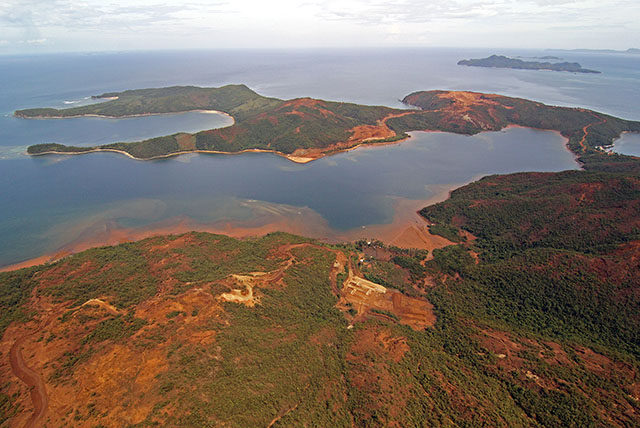 EFFECTS OF MINING. This is how massive mining operations look like from the air. Taken above the municipality of Carrascal in Surigao del Sur on Tuesday, 7 Oct 2014. MindaNews photo by ERWIN MASCARINAS
EFFECTS OF MINING. This is how massive mining operations look like from the air. Taken above the municipality of Carrascal in Surigao del Sur on Tuesday, 7 Oct 2014. MindaNews photo by ERWIN MASCARINAS
“Reforms in the fiscal regime of mining such as an increase in mineral royalty payments, the imposition of windfall gain tax, and the scrapping of unnecessary incentives should be enacted for a more fair economic contribution from the extractive industry” before even considering the lifting of the ban, Bantay Kita said, adding reforms in the Philippine Mining Act of 1995 are urgently needed to ensure “proper management and governance of our mineral resources, address social justice and environmental mining issues, and fully respect the rights of local communities, indigenous peoples, and local government units to approve or disapprove mineral extraction.”
The group also called on the DENR and the National Commission on Indigenous Peoples (NCIP) to conduct a comprehensive review of existing mining contracts and agreements and that the review “should include genuine stakeholder consultations with local government units and mining-affected communities.”
It also urged the Department of Finance and DENR to “actively support legislation rationalizing revenue sharing schemes and mechanisms that are fair and equitable, considering the one-time nature of mineral resource extraction” and called on President Duterte to “reconsider EO 130 and declare as urgent reforms in the mining fiscal regime to ensure a more equitable, transparent, and fair revenue sharing scheme and mechanisms.”
Sustainable development
In Davao City, Atty. Mark Peñalver, Executive Director of the Interfacing Development Interventions for Sustainability (IDIS), said the lifting of the moratorium “goes against the very mandate of our Constitution that the State should protect and advance the right of the people to a balanced and healthful ecology.”
He noted that one of the justifications for the ban is that it can support the “build, build, build” program of the government but “this does not agree with the development direction that we should be taking, i.e. sustainable development. We cannot just promote economic prosperity at the expense of our environment and our people.”
“You cannot expect a sustained economic prosperity if our environment is destroyed or left behind. Sustainable development requires the nexus of economics and environmental protection,” he said.
Peñalver also cited the Mining Industry Statistics released by the Mines and Geo-sciences Bureau on May 29, 2020 showing that the mining industry contributes less than 1% to the Philippine gross domestic product and less than 1% to employment. (Carolyn O. Arguillas with reports from Bong Sarmiento and Antonio L. Colina IV)
